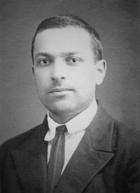
Леў Сямёнавіч Выгоцкі (November 17, 1896, Orsha, Russian Empire, present-day Belarus-June 11, 1934, Moscow, Soviet Union) or Lev Vygotsky was a Russian psychologist of Jewish origin, one of the most prominent theorists of developmental psychology, founder of historical-cultural psychology and a clear precursor of Soviet neuropsychology, of which the Russian physician Alexander Luria would be the greatest exponent. His work was discovered and disseminated by the academic circles of the Western world in the 1960s. The prolific character of his work and his early demise made him known as "the Mozart of Psychology" (characterization created by Stephen Toulmin). The fundamental idea of his work is that the development of humans can only be explained in terms of social interaction. Development consists in the internalization of cultural instruments (such as language) that initially do not belong to us, but belong to the human group in which we are born, which transmits cultural products through social interaction. Culture, then, has a preponderant role in Vygotsky's theory.




